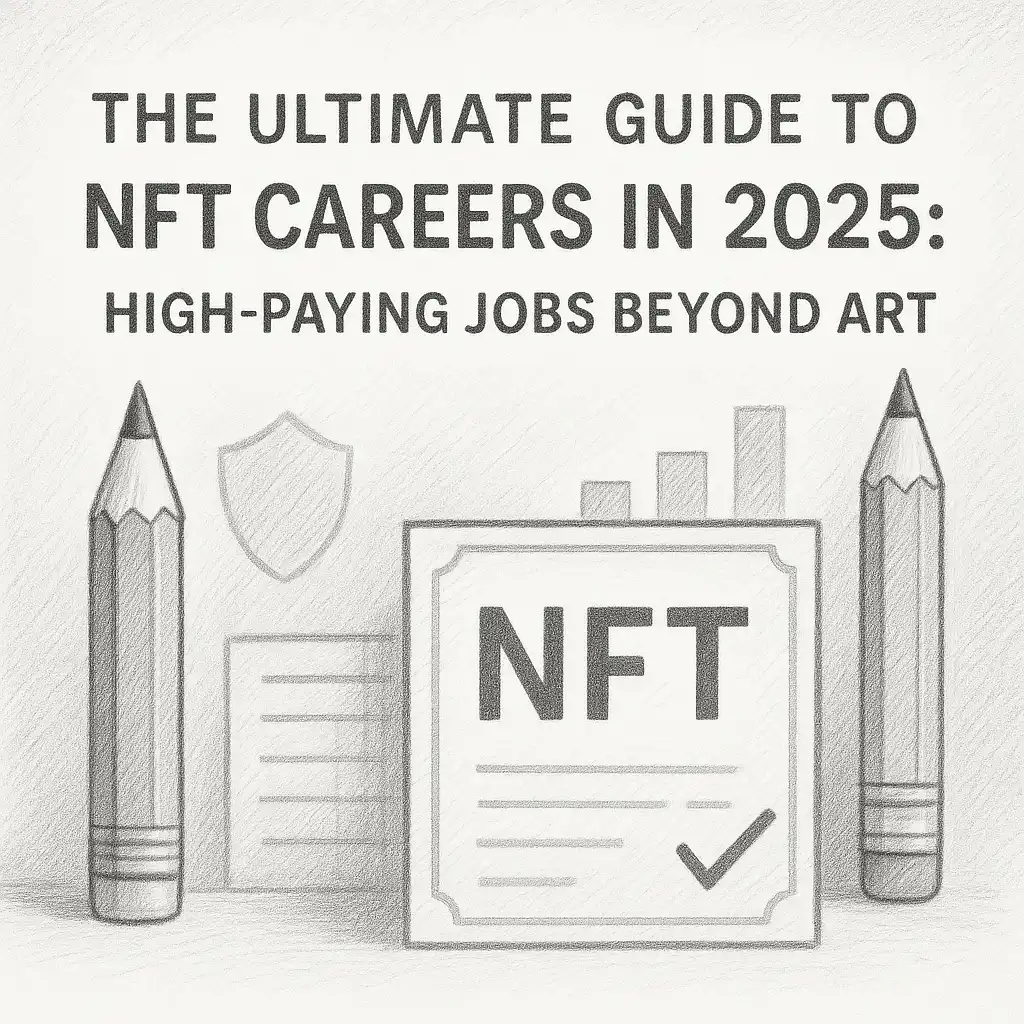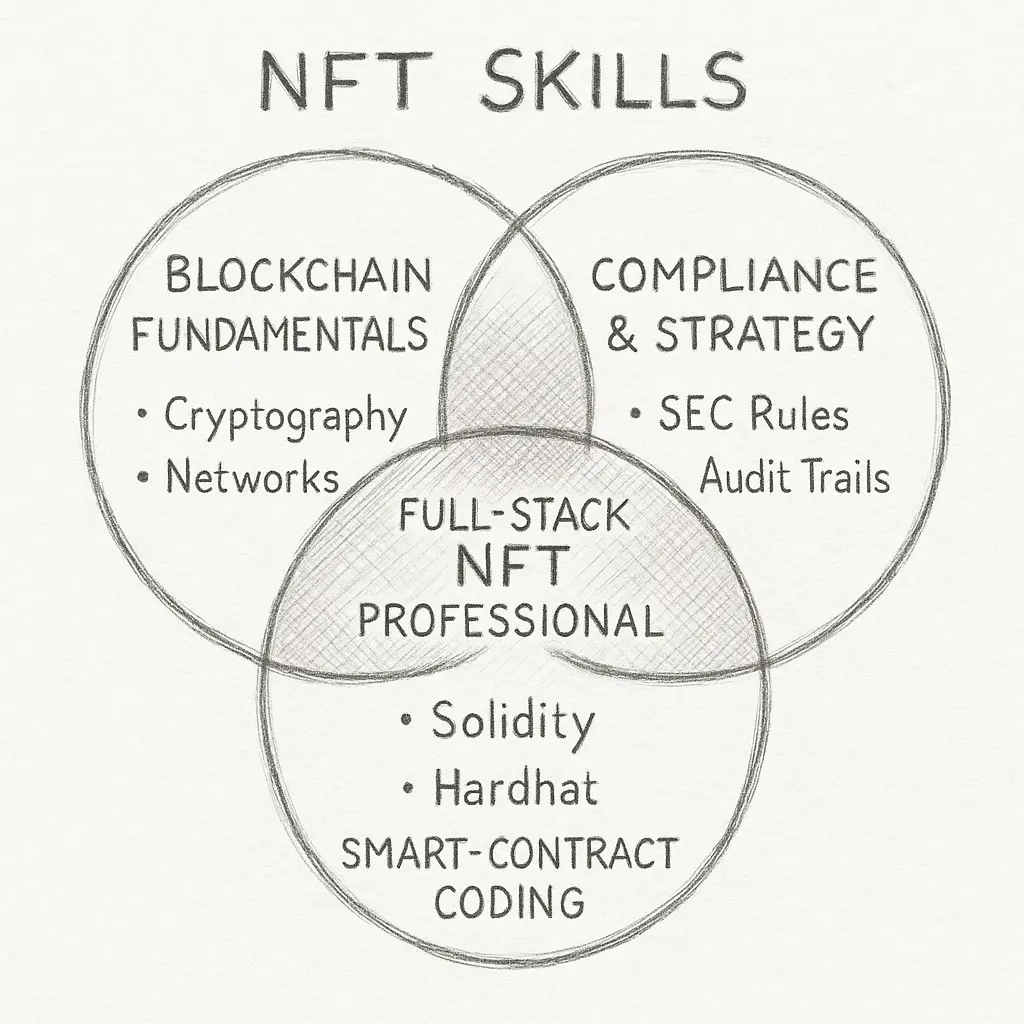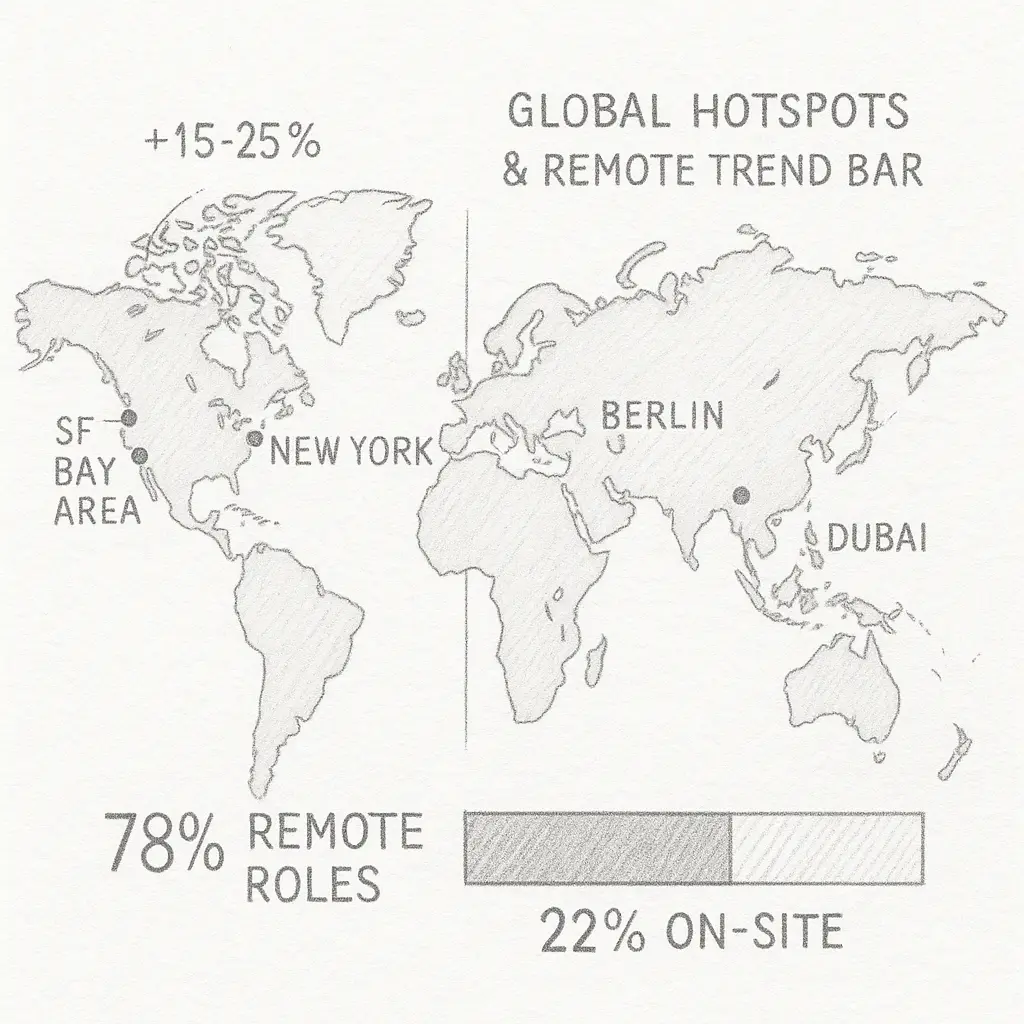The Ultimate Guide to NFT Careers in 2025: High-Paying Jobs Beyond Art

You know those NFT pictures that cost thousands of dollars? Well, now there are actual jobs working with that same technology.
Most people think NFTs are just weird digital art that rich people buy. But here's the thing - companies like Walmart and big game makers are now using NFT technology for completely different stuff. And they need people to work on these projects.
The cool part? These jobs pay really well. You can start at $65,000 a year, and if you get really good at it, you can make over $250,000. That's more than most doctors make.
What kind of jobs are we talking about?
Think about it this way:
Some people help companies follow the rules when they use NFTs (like lawyers, but cooler)
Others build video games where players can actually earn money
Some make sure the stuff you buy online is real and not fake
You don't need to be a computer genius to get started. You don't even need to understand how NFTs work right now. You just need to be willing to learn something new.
Who can do these jobs?
People who write computer code
People who work in business
People who have never worked in tech before but want to try
This guide will show you exactly what these jobs are, how much they pay, and what you need to do to get hired. No confusing tech words. No complicated explanations. Just simple steps you can follow.
Ready to learn about jobs that most people don't even know exist yet?
TL;DR:
NFT careers extend far beyond digital art into supply chain, gaming, legal compliance, and enterprise solutions
Average salaries range from $85,000-$180,000 with smart contract developers earning $125,000-$250,000 annually
Technical skills in Solidity, Web3 frameworks, and blockchain platforms remain most in-demand according to industry reports
Regulatory compliance expertise is becoming increasingly valuable as SEC guidelines evolve
Remote work opportunities dominate with 78% of NFT positions offering location flexibility
Entry-level positions are available through MIT, Cornell, and Linux Foundation certification programs
The Evolution of NFT Careers: Beyond the Hype
Understanding the Modern NFT Landscape
The NFT ecosystem has matured significantly since 2021's speculative peak. Today's blockchain career opportunities focus on practical applications that solve real business problems. Major corporations like Walmart use VeChain's blockchain solutions for supply chain management, while luxury brands like LVMH implement NFT authentication systems through their AURA Blockchain Consortium.
The Bureau of Labor Statistics projects 35% growth for blockchain developers through 2030, significantly outpacing other technology roles. This evolution has created three distinct career tracks with verified salary data from leading employment platforms.
High-Demand NFT Career Paths in 2025
Smart Contract Developer and Auditor
Smart contract developers represent the backbone of the NFT ecosystem, with Web3.career reporting average salaries of $125,000-$250,000 annually.
Primary Responsibilities:
Designing and implementing NFT smart contracts using Solidity and Vyper
Optimizing gas fees and contract efficiency for Ethereum, Polygon, and Solana
Conducting security audits to prevent vulnerabilities and exploits
Developing integration APIs for marketplace and wallet compatibility
Creating upgradeable contract architectures for long-term sustainability
Technical Skills Required:
Programming Languages: Solidity (essential), JavaScript, Python, Rust
Blockchain Platforms: Ethereum, Solana, Polygon, Avalanche, BNB Chain
Development Tools: Hardhat, Truffle, Remix IDE, OpenZeppelin libraries
Testing Frameworks: Jest, Mocha, Waffle for comprehensive contract testing
Security Tools: MythX, Slither, Echidna for vulnerability detection
Career Progression Path:
Junior Developer (0-2 years): $65,000-$95,000 annually
Mid-Level Developer (2-5 years): $95,000-$140,000 annually
Senior Developer (5+ years): $140,000-$200,000 annually
Lead Architect (7+ years): $180,000-$250,000+ annually
Industry Applications:
Smart contract developers work across diverse sectors implementing VeChain's supply chain solutions and enterprise blockchain applications. The Bureau of Labor Statistics projects 35% growth for blockchain developers through 2030, significantly outpacing other technology roles.
Entry Strategy:
Begin with MIT's Blockchain Technologies course or Cornell's Blockchain Essentials program. The Linux Foundation offers Hyperledger certification programs while ConsenSys Academy provides comprehensive developer bootcamps. Build portfolios showcasing ERC-721 implementations and contribute to open-source projects through Ethereum Foundation resources.
Blockchain UX/UI Designer for NFT Platforms
The user experience challenge in blockchain applications creates substantial demand for designers understanding both traditional design principles and Web3 complexities, with salaries ranging $70,000-$220,000 based on experience.
Core Design Challenges:
Simplifying wallet connection flows for mainstream users
Designing intuitive gas fee explanations and optimization interfaces
Creating seamless marketplace browsing experiences across blockchain networks
Developing mobile-responsive designs for NFT viewing and trading
Implementing accessibility standards for diverse user demographics
Essential Skills and Tools:
Design Software: Figma, Adobe XD, Sketch for interface design
Prototyping Tools: InVision, Principle, Framer for interactive demonstrations
Web3 Knowledge: Understanding wallet integration, transaction flows, blockchain limitations
User Research: Experience conducting usability testing with crypto-native and traditional users
Frontend Collaboration: Basic HTML/CSS knowledge for developer communication

Specialized Expertise Areas:
Marketplace Design involves developing browsing and purchasing flows for platforms competing with OpenSea, which maintains market dominance. Gaming Interface Design requires understanding in-game economies and player progression systems. Wallet Interface Design focuses on creating intuitive experiences for MetaMask, Coinbase Wallet, and hardware wallet integrations.
Salary Expectations by Experience:
Entry-Level Designer (0-2 years): $70,000-$100,000 annually
Mid-Level Designer (2-5 years): $100,000-$145,000 annually
Senior Designer (5+ years): $145,000-$190,000 annually
Design Director (7+ years): $170,000-$220,000+ annually
NFT Supply Chain and Compliance Manager
As NFTs gain adoption in enterprise environments, professionals understanding both blockchain technology and regulatory compliance command premium salaries reflecting the specialized knowledge required.
Primary Responsibilities:
Developing NFT implementation strategies for product authentication and traceability
Ensuring compliance with SEC regulations, EU Digital Services Act, and jurisdictional requirements
Managing relationships with blockchain platform providers like VeChain
Creating audit trails and reporting systems for regulatory bodies
Training internal teams on NFT technology and compliance procedures
Industry Applications by Sector:
Luxury Goods Authentication: LVMH uses blockchain-powered solutions through their AURA Consortium to combat counterfeiting. The company faces ongoing patent litigation regarding NFT display technology, highlighting the complex intellectual property landscape.
Pharmaceutical Supply Chain: NFT tracking helps prevent counterfeit medications, requiring navigation of FDA regulations and international pharmaceutical standards.
Enterprise Solutions: VeChain's partnerships with BMW, Walmart, and DNV demonstrate real-world blockchain applications requiring specialized compliance expertise.
Required Certifications and Knowledge:
Legal Framework Understanding: Securities law, consumer protection, data privacy regulations
Industry-Specific Compliance: FDA (pharmaceuticals), USDA (agriculture), FTC consumer protection
Blockchain Platforms: Enterprise solutions like VeChain ToolChain, IBM Food Trust
Project Management: PMP or Agile certifications for cross-functional implementation teams
Compensation Structure:
Compliance Specialist (0-3 years): $75,000-$110,000 annually
Senior Manager (3-7 years): $110,000-$165,000 annually
Director Level (7+ years): $165,000-$230,000+ annually
VP/C-Suite (10+ years): $200,000-$350,000+ with equity compensation
Skills Development and Certification Pathways
Technical Skill Development Roadmap
Phase 1: Blockchain Fundamentals (2-3 months)
Begin with MIT's Introduction to Blockchain Technologies or Cornell's Blockchain Essentials program. These prestigious institutions provide foundational understanding of consensus mechanisms, cryptography basics, and blockchain architectures.
Phase 2: Smart Contract Programming (3-6 months)
Learn Solidity through ConsenSys Academy's structured programs or Linux Foundation's Hyperledger courses. The Ethereum Foundation provides comprehensive developer resources including tutorials, documentation, and community support.
Phase 3: Platform Specialization (2-4 months)
Choose primary blockchain platforms based on career goals. Ethereum remains most versatile for NFT applications, while VeChain offers enterprise-focused solutions. Solana provides high-performance alternatives for gaming applications.
Phase 4: Security and Auditing (3-6 months)
Security represents the highest-paid specialization within smart contract development. Learn vulnerability patterns through Linux Foundation security courses and practice identifying issues in deliberately vulnerable contracts.
Professional Certification Programs
MIT Programs:
Blockchain Technologies: Business Innovation and Application
Blockchain and Crypto Applications: From DeFi to Web3
Cornell University:
CS-1998: Introduction to Blockchain
Linux Foundation:
ConsenSys Academy:
Blockchain Essentials certification
Regional Market Analysis and Remote Work Opportunities

Geographic Salary Variations
United States Market:
Web3.career data shows the US dominates NFT career opportunities with highest average salaries globally. San Francisco Bay Area leads compensation with 15-25% premiums above national averages. New York City offers strong traditional finance crossover opportunities. Bureau of Labor Statistics projects 35% growth for blockchain developers through 2030.
Global Opportunities:
Remote work comprises 78% of NFT positions, significantly higher than traditional tech roles. This global accessibility creates opportunities for professionals worldwide to access international salary levels.
Industry Growth Projections
According to Market and Market reports, the blockchain market is projected to grow from $17.57 billion in 2023 to $469.49 billion by 2030. The Global Blockchain Market Report forecasts that blockchain technology could create over 1 million new jobs by 2030 if adoption accelerates.
Regulatory Landscape and Compliance Considerations
Current Regulatory Environment
The SEC's approach to NFT regulation continues evolving. Recent developments include:
Closure of OpenSea investigation without charges
Digital Asset Market Clarity Act progress in Congress
State-level regulations varying across jurisdictions
FTC Oversight:
The Federal Trade Commission maintains authority over deceptive practices in NFT marketing. Companies must ensure transparent disclosure of NFT ownership rights and avoid misleading representations about digital asset value.
International Considerations:
NFT legal frameworks vary globally, requiring professionals to understand multi-jurisdictional compliance requirements for international projects.
Building Your NFT Career Portfolio
Educational Foundation
Formal Education Programs:
Self-Directed Learning:
Ethereum Foundation provides extensive developer resources including documentation, tutorials, and community support. GitHub repositories offer open-source learning materials from leading blockchain education providers.
Professional Development Resources
Industry Organizations:
Certification Programs:
Professional certifications from established institutions carry significant weight with employers. MIT and Cornell programs provide particular credibility in the financial services sector.
Future Trends and Career Evolution
1.Emerging Technologies Integration
AI and NFT Convergence:
Artificial intelligence increasingly intersects with NFT technology through procedural generation, authenticity verification, and personalized curation systems.Enterprise Adoption:
VeChain's partnerships with major corporations demonstrate growing enterprise blockchain adoption. LVMH's blockchain initiatives showcase luxury brand integration strategies.Regulatory Maturation:
Congressional progress on digital asset legislation and evolving SEC guidance will create standardized compliance frameworks requiring specialized expertise.People Also Asked
Q: What educational background is required for NFT careers?
A: NFT careers don't require specific degrees, but relevant backgrounds help. MIT offers blockchain business courses, while Cornell provides technical certification programs. The Linux Foundation offers Hyperledger certifications accessible regardless of educational background. Many successful professionals transition through ConsenSys Academy bootcamps and Ethereum Foundation resources.
Q: How long does it take to break into the NFT industry?
A: Timeline varies significantly by role. Technical positions typically require 6-12 months intensive learning through programs like MIT's blockchain courses or Cornell's certification programs. Business professionals with relevant backgrounds can transition in 2-4 months using Linux Foundation training or ConsenSys Academy courses.
Q: Are NFT jobs sustainable long-term?
A: While speculative trading has cooled, enterprise adoption continues growing. VeChain's corporate partnerships and LVMH's blockchain initiatives demonstrate practical applications. Bureau of Labor Statistics projects 35% growth for blockchain developers through 2030, indicating sustainable career prospects.
Q: What programming languages are most important for NFT development?
A: Solidity dominates Ethereum-based development with average salaries of $150,000-$257,000 annually. JavaScript is crucial for Web3 integration. Python supports data analysis and backend systems. Ethereum Foundation resources and ConsenSys Academy courses provide comprehensive language training.
Q: How do NFT salaries compare to traditional tech jobs?
A: Web3.career data shows NFT roles offer 10-30% salary premiums. Smart contract developers average $125,000-$250,000 annually, while blockchain engineers earn $78,000-$262,000 based on experience. Web3.career reports blockchain developers in India earn $30,000-$115,000 annually.
Q: What are the biggest challenges in NFT careers?
A: Regulatory uncertainty creates compliance challenges as SEC guidance evolves. Rapid technology changes require continuous learning through programs like MIT blockchain courses. Market volatility affects project funding and job security. Technical complexity creates steep learning curves requiring structured education from established institutions.
Q: Which blockchain platforms offer the best NFT career opportunities?
A: Ethereum provides maximum opportunities due to market dominance and extensive developer resources. VeChain offers enterprise-focused positions with major corporate partnerships. Solana provides high-performance alternatives for gaming applications. Choose platforms based on career interests and available educational resources.
Q: How important is community involvement for NFT careers?
A: Community participation proves crucial for career development. Ethereum Foundation emphasizes community engagement, while ConsenSys Academy provides alumni networks. Contributing to open-source projects through GitHub and participating in Linux Foundation communities demonstrates expertise and builds professional relationships.
Q: What certifications are most valuable for NFT careers?
A: MIT blockchain certificates carry significant weight in business roles. Cornell University certifications provide technical credibility. Linux Foundation Hyperledger credentials demonstrate enterprise blockchain expertise. ConsenSys Academy certifications offer practical development skills with industry recognition.
Q: Are there entry-level NFT positions for complete beginners?
A: Yes, entry-level opportunities exist in community management, content creation, and junior development roles. MIT offers introductory blockchain courses requiring no technical background. Cornell's programs include beginner-friendly options. Linux Foundation provides free introductory courses for newcomers. Focus on building foundational knowledge through established educational institutions rather than self-taught approaches.
Q: How do I transition from a traditional career to NFTs?
A: Start with educational programs from recognized institutions. MIT offers business-focused blockchain courses for professionals. Cornell provides certificate programs combining theory and practice. Linux Foundation offers role-specific training for various backgrounds. ConsenSys Academy provides structured transition programs with mentorship support. Build portfolios demonstrating NFT knowledge application to existing expertise.
Q: What regulatory knowledge is essential for NFT careers?
A: Understanding SEC guidelines is crucial as regulations evolve. FTC oversight of deceptive practices affects marketing roles. State-level regulations vary significantly. International frameworks differ across jurisdictions. Stay current through legal publications and regulatory updates from established sources rather than speculative commentary.
The NFT career landscape in 2025 offers unprecedented opportunities for professionals combining traditional expertise with emerging blockchain technology. Success requires continuous learning through established educational institutions, community engagement with recognized organizations, and focus on practical applications solving real-world problems.
Whether you're a developer, designer, business professional, or industry specialist, building sustainable NFT careers requires solid educational foundations from credible sources and authentic professional relationships within the established blockchain community.
The industry's maturation creates stability while maintaining innovation potential, supported by growing enterprise adoption and evolving regulatory clarity. Focus on developing transferable skills through recognized certification programs, building authentic professional relationships through established communities, and staying current with regulatory developments through authoritative sources to build sustainable, rewarding careers in this transformative field.
Author: Shubhada Pande, Founder, Artofblockchain.club
